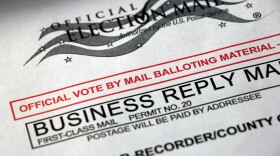Coalville joins Oakley, Park City and Hideout in exploring a new system of voting for the upcoming 2025 municipal election.
In ranked choice voting, residents rank their preferred candidates rather than casting a single vote in a binary election.
Cities and towns have had the option to use it since 2018, but in the Wasatch Back, only Heber has taken it up so far. Summit County Clerk Eve Furse says it’s actually preferred for internal party elections.
“Both the Democratic and Republican parties in our state have been using ranked choice voting to fill vacancies from before [ranked choice voting] was ever passed,” Furse told Coalville city councilmembers Feb. 10. “That's been the way for a while that they've found works well for them.”
The pilot program allowing ranked choice voting expires on Jan. 1, 2026, although a bill to extend it another 10 years was proposed.
However, GOP Sen. Todd Weiler’s Senate Bill 107 has stalled. The Senate Government Operations and Political Subdivisions Committee voted to hold it in on Jan. 29 after an hour of debate.
Proponents of ranked choice voting like Weiler, Furse and former Heber Mayor Kelleen Potter hope it reduces political polarization and encourages people to run for local office. It might make elections cheaper by reducing the number of ballots needed by ending the need for primaries.
During debate over the bill, Republican Sen. Daniel Thatcher said the pilot program proves it’s too complicated for voters. More ballots are being discarded because they’re filled out incorrectly.
“For me, there is nothing that gets me past: how many votes is it okay to discard?” he said during the committee debate Jan. 29. “So I would like to see this expire. I'd like to see it go away.”
Last week, Furse told the Coalville City Council that Utah Valley University polls show the vast majority of voters understand how to vote by ranking their choices.
Thatcher said those people don’t know if their vote actually counted, and he believes ranked choice voting has “a ton of money being spent on lobbyists and PR” behind it.
“It's really, really popular, because people think that if we change the election system, we'll change the election outcomes, and that is partially true, but maybe not the way they think, and maybe the cost isn't worth it,” the state senator said.
Under ranked choice voting, if no candidate has the majority of votes on election night, there’s an automatic runoff. That means the lowest vote-getter is eliminated, and all those ballots are then redistributed to the candidates those voters ranked second.
That process repeats until someone crosses the threshold to win.
It’s not yet clear whether SB107 will get a second chance before the committee chaired by Sen. Ron Winterton, who represents the Park City, Kamas and Heber City areas.
Meanwhile, cities and towns have until May 1 to decide to use ranked choice voting this November.





